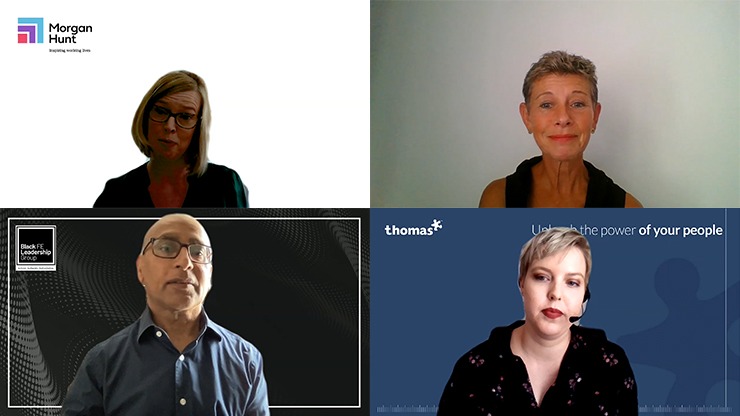- Accessibility
- Request a Call Back
- Quick Drop CV
- Submit Timesheet
- About Us
- For Candidates
- For Clients
- News & Views
- Events

This year’s Employee Appreciation Day is on Friday 4th March. It will be the first since the onset of the Great Resignation. There are many theories about what is driving post-pandemic resignations. But one thing is clear: UK workers often feel burned out and undervalued.
With scattered teams working from home (WFH) and hybrid working the ‘new normal' it is easy for employees to feel disconnected. And underappreciated.
Companies know that their employees are their greatest asset. Employee Appreciation Day provides an opportunity for HR teams and managers to take stock. Employee appreciation is essential in fostering a motivated and happy workforce. An eachperson.com survey revealed that 86% of employees said recognition makes them happier at work.
The words “recognition” and “appreciation” are not interchangeable. Recognition is about giving positive feedback based on results or performance. Appreciation is about acknowledging a person’s value. This difference matters because recognition and appreciation take place for different reasons. Often businesses focus on praising positive outcomes (recognition). Companies should ensure they’re doing both.
A Glassdoor Employee Appreciation Survey shows that 53% of employees say more appreciation from their boss would help them stay longer at their company. Businesses that engage in employee appreciation see improved retention rates and lower staff turnover.
Companies conducting exit interviews may see that lack of appreciation is a culprit in driving employees to leave. Some may have stayed if their employers offered more rewards and recognition.
The need to belong is part of the human condition. A culture that celebrates career milestones, life events, and group achievements increases a candidate's desire to join and grow within the business.
In a Harvard Business Review article, Michael O’Malley states: “The best places to work provide people with life satisfaction, as opposed to job satisfaction alone.”
In the TED Talk: 'The Power of Appreciation' 43% of people who feel 'appreciated' are more effective and productive.
With WFH, hybrid working and the possibility of a four-day week, productivity is a hot topic. Appreciated employees are more engaged at work. Findings from BetterUp show that 56% of employees who felt belongingness have a higher level of job performance.
SurveyMonkey reports that 82% of workers consider appreciation an important part of their happiness. An Oxford University report shows that happier workers are 13% more productive at work.
Employee appreciation takes many forms:
It’s a good idea to ask employees what they would like so you are rewarding staff with something they value.
Nowadays, more companies value employee appreciation, rewards and recognition. It's something we see here at Morgan Hunt with our clients. They include:
There is a correlation between work-life balance and employee performance and job satisfaction. Work-life balance:
Remote working throughout lockdowns undoubtedly affected employee wellbeing. A company-wide day off to encourage employees to look after their well-being can help.
Employee recognition refers to employees’ accomplishments. The most common programmes recognise one-time achievements. Programmes can recognise team and individual work throughout the year. Consider asking current employees the type of recognition they desire most.
Over half (56%) of HR leaders believe recognition or appreciation schemes help with recruitment (SHRM). Candidates want to associate with employers that recognise and appreciate their employees. These can include:
Do something special for employee birthdays and work anniversaries. A hbr.org study found that employees were likely to leave after a year of employment. Don’t let the anniversary of an employee’s hire go unnoticed. Acknowledging the important dates across your team shows you value them as individuals. This could be:
Enabling employees to give feedback shows you value their input. Anonymous feedback portals or surveys ensure honest, quality responses. Consider having a mix of questions, like "Does your manager make you feel valued?" and allow employees to provide feedback. Employees feel valued the more they feel heard and want to contribute to the success of a company.
Giving and receiving appreciation increases morale, collaboration and job satisfaction. Some companies have online platforms where managers and peers can praise colleagues.
Investing in professional development shows you value staff. For effective and cost-efficient ways to let employees learn new skills consider:
Events throughout the week or month may include:
A study from Each Person found that 51% of UK employees say a ‘thank you’ would make them feel more appreciated. A heartfelt thank you is a simple way to show appreciation. While not everyone needs a ‘thank you’ to do a good job, many do. It won’t hurt those who don’t need to hear it, but it will mean much to those who do.
Finally, employee appreciation shouldn’t take place on one day. It should be integral to your company culture and adopted by management. Your employees are your most precious asset, now it’s time to appreciate them.
Many people working within the Further Education sector speak about the decline in Black, Asian and minority ethnic (BAME) college leaders. The number of black and ethnic minority principals leading FE colleges in England has dropped from 13% in 2017 to around 5% or 6% in 2020. On the flip side, the number of BAME students has increased to represent 30% of FE students.
With 239 FE colleges in England, it is estimated that between 12 and 14 are currently led by BAME principals, although the Association of Colleges has no official data. And, for those already working in FE, black staff in the sector are not only under-represented, but less likely to be promoted or get a permanent contract.
The Black Further Education Leadership Group (BFELG) is demanding urgent action to address racism in FE which is undermining “the sector’s ability to engage with all its constituent communities”. They have introduced a ‘10 Point Plan’ laying out possible solutions to the current situation.
The recent webinar ‘Anti-racist Board and Executive Search Recruitment Practices’ was a panel discussion focused on anti-racist board and executive search recruitment practices. The session was a solid starting point to address these challenges.
Anti-racist and diverse recruitment practices in the FE sector rely on collaboration. It’s about FE Institutions coming together with commercial companies, such as specialist recruitment businesses, to provide solutions and promote best practices.
So much starts with recruitment and selection. And, recruitment agencies are in a position of influence. If we don’t address it with our clients we are adding to the problem.
The webinar featured three of the FE sector’s leading recruitment companies: AoC Services, Peridot Partners and Morgan Hunt, who along with FE Associates and Protocol have come together in this way for the first time, demonstrates the importance we all place on anti-racism, and our commitment to change.
Hilary Clifford, Director, AoC Services and Drew Richardson-Walsh, Director, Education Practice, Peridot Partners, along with myself all agree that we want people who are working in, and applying for positions in the FE sector to have the confidence that they are being judged on their ability, competence and potential - not their ethnicity.
There is a real opportunity for FE recruitment companies to work with their clients to:
The Joint Commitment companies are an example of collaborative system leadership for change. This is a remarkable collaboration considering that under normal circumstances these companies operate as competitors in the FE market.
When it comes to recruitment for leadership roles, recruitment in the FE sector is a mixed bag, with institutions hiring directly and through recruitment agencies. Boards, HR departments and recruitment companies all have a part to play in increasing representation from black communities. They also have a major role in challenging and reversing the status quo.
When it comes to recruitment for institutions, FE colleges need to ensure that they can clearly articulate their value proposition, culture and beliefs. For the process to be successful, these establishments must ensure they are living and breathing these, and that what they promote is a reality when candidates join.
It takes more than just a diversity and inclusion policy. For it to be effective, each area needs to be addressed: anti racism, gender, sexual orientation, age and disability - and not address everything together as one.
Morgan Hunt is the first private sector organisation to become an affiliate of the BFLEG and support their BFELG 10 Point process. We are pleased to support the objectives, and specifically item six of the plan: “College recruitment processes, including the deployment of recruitment companies, to proactively address imbalances in the diversity of leadership at all levels.”
As recruitment professionals, we recognise the need for a shift in approaches to the development, attraction and recruitment of leaders and governors. Here at Morgan Hunt, we are seeking to proactively address imbalances in the diversity of leadership at all levels, particularly through the development of anti-racist practices and approaches in recruitment.
For us it's about growing awareness, listening to colleagues and candidates talk about their own experiences and focussing on the key challenges and the work that needs to be done to improve the situation, and crucially taking action.
At Morgan Hunt, we have a big focus on diversity and inclusion. Anti-racism has been a big part of that, as has our relationship with BFLEG and the training delivered by them. One of the positive actions agreed from it is to break down the standard recruitment process both internally and externally.
We’ve also:
We would encourage anyone who hasn't been through this training to do so. A number of our clients have gone through the same training and its been useful to share what stage of the journey we are at with them and collaborate. The course has been both challenging and eye opening. It’s not right to recommend appropriate solutions to our customers if we don’t go through this process ourselves.
We’ve still got a long way to go. It's not finished and it's not fixed and there is still a lot to do. Despite having an ethnically diverse workforce our Senior Leadership team isn’t as diverse as we’d like it so we’re going through a process to improve that.
Anti-racism needs to be at the heart of selection and recruitment within FE. As a group of search and recruitment firms dedicated to supporting the leadership of the sector, we all agree that when recruitment is done well it should enable opportunities for a broad range of people.
Whatever your involvement within FE is, we all want to see a shift in data when it comes to the number of black leaders progressing through the management ranks and into senior leadership posts in the FE sector.
Without systematic monitoring, training or positive action to address the issue, it isn’t surprising that the FE sector has reversed in terms of BAME leadership. But, it all starts at the beginning. Recruitment.
By Luke O’Neill, Education Strategy Director at Morgan Hunt


It’s a new year, so it’s a time that many people think about trying something new. For you, this might mean exploring new job opportunities. In this article we’ve outlined the best ways to approach finding a new job in 2022.
Firstly, to know how to navigate the job market, it’s important to understand the current conditions.
Last year the market was turbulent because of the pandemic, but by the end of the year the market was strong. The unemployment rate decreased by 0.4 percentage points on the quarter to 4.2 per cent by the end of October. More people were back in work, including those who had been on the furlough scheme until it ended in September.
This general market trend also applied to public sector employment where the number of employees increased in September 2021 by 0.4% in comparison to June.
Yet, at the same time, the number of job vacancies continued to grow as the effects of the pandemic began to soften and organisations looked to expand. Between September and November, the number of opportunities had increased to more than 1.2 million. However, by November the rate of this expansion had begun to slow somewhat.
This increase in vacancies was paired with a skills shortage due to hundreds of thousands of people leaving the workforce during the pandemic, meaning employers struggled to hire new staff.
For jobseekers such as yourself this means that, for now, the market continues to be led by you. Jobseekers have a greater range of opportunities to choose from and have more leverage to demand the conditions they want. Further benefits for jobseekers include increases in starting pay due to the imbalance between supply and demand.
A straightforward CV that outlines your most relevant and recent experience is key to finding a new job. And although there are plenty of jobs out there, you’ll still be competing with others, so you want to have the best chance of standing out.
Here are some best practice guidelines to follow:
Ideally, you should tailor your CV for every job you apply for, but having a good template as a starting point will save you time and can be used if you don’t have time to customise it for a specific vacancy.
When tailoring your CV, read the job description and include relevant keywords that apply to your experience to ensure your CV is searchable in hiring managers’ and recruiters’ systems.
For more guidance on how to write an effective CV, read our full CV writing guide.
A cover letter isn’t always necessary as part of an application. We don’t require them at Morgan Hunt for example. However, other companies or job boards often require them, so it’s worth doing. And even if they’re not necessary, following up your application with a cover letter can be a good way to differentiate yourself from other applicants.
In a nutshell, your cover letter should explain the why behind your application. Why you think you’re right for the job and why you’re interested in that specific role or organisation.
You can read our guide to learn how to write an effective cover letter.
Given the number of vacancies out there, there’s more than enough to choose from. So how do you find the best ones, or the ones you’re most suited to? We recommend using a variety of methods to support your search which will give you exposure to all available opportunities and allow you to pick right ones.
When searching for jobs on Google or other websites, use keywords related to the type of job you want and the responsibilities you’d like to have. Being specific and using more keywords will narrow down the number of results, so you’ll only see the most relevant jobs for you.
Having a recruitment consultant working for you who understands your skills and what you’re looking means you’ll be put forward for suitable roles without having to do the heavy lifting yourself. This can save you a lot of time and effort.
Another benefit is that many employers don’t advertise roles themselves and will exclusively use recruitment agencies, so using an agency can get you access to jobs that are not being advertised.
Job alerts are another great way to automate your search. Google Jobs alerts are especially useful as they will pull jobs from across the internet and email them to you. To set these up, perform your search in Google Jobs. Next, turn on job alerts at the bottom left of the page.

Many other sites, such as job boards, support job alerts too. You can also sign up to Morgan Hunt job alerts to be notified about the best and most recent public sector jobs.
LinkedIn isn’t for everyone or every type of profession, but for most it’s a great way to network with others in your current or desired industry and set yourself up to be contacted about opportunities.
You should update your LinkedIn profile like you would your CV by including your most recent and most relevant experience. With the extra space you have to work with on LinkedIn you can also include information about your specific interests, career aspirations or other skills you have.
All the information you provide in your profile summary and experience is searchable by other people on LinkedIn, so recruiters will be able to find you for relevant vacancies they’re hiring for.
It goes without saying that to get a job, you will need to interview for it if your application is successful. This is your opportunity to sell yourself, so being confident is important. But interviews can be nerve-wracking, so to avoid making mistakes you will later regret, practice for your interviews.
You should research the company and the role you are applying for, not only to demonstrate your interest in the job, but to help you come up with your own questions for things you’d like to know more about. Asking questions in the interview reflects well on you and will help you decide if the role is what you are looking for.
When it comes to answering their questions, make sure you prepare for general questions beforehand. You will want to provide relevant examples of work you’ve done that match the skills they’re looking for, so make sure you’re familiar with your experience. Writing all your experience out can be a helpful exercise to do this.
Here are some examples of basic interview questions you might face:
By applying the tips in this article, you’ll be able to navigate the current job market with ease. Use them and we’re confident that you’ll find the right job for you in no time.
If you are looking for support in your job search and are interested in opportunities within the public sector, why not explore the vacancies we’re currently recruiting for or submit your CV to us through our Quick Drop CV tool – it takes less than a minute.
On 23rd March 2021 Morgan Hunt hosted a webinar on developing an inclusive hiring strategy. We were joined by Amarjit Singh Basi from the Black FE Leadership Group, Ann Allcock from Marshall E-Learning, and Kira van Niekerk from Thomas International.
The session covered both the importance of having an inclusive hiring strategy, as well as the practical steps to implementing one. Watch the full recording below.


During the pandemic the market was such that redundancies and furloughing were high, resulting in fewer jobs and more people unemployed. As the grasps of the pandemic slowly lifted, expectations were that market conditions would return to normal. But to the suprise of many, the situation flipped and we are now experiencing a skills shortage in the UK.
Job vacancies in Britain are roughly 20 percent higher than before the pandemic. Employers are on the search for people to fill their open positions, and there are still many seeking work, but the jobs don't align with what people are prepared for or want to do.
The current market conditions were explored further in an article by the New York Times, in which Morgan Hunt's Managing Director, Dan Taylor, provided comment on the situation. When asked about the company's experience as a recruitment agency, he said "This has been a very quick bounce. In six months we went from struggling to find jobs for candidates who are registered with us to a situation where we just can’t find the specific skilled and experienced staff we need".

Image from The New York Times. Photographed by Tom Jamieson for The New York Times.
One example of the difficulties faced by employers is when Morgan Hunt was helping a public housing association hire a senior fire officer. Two people were ready to accept the job, until a department store offered higher pay, causing the candidates to pull out from the senior fire officer position.
The pandemic has affected every part of society, but young people face a particularly uncertain time as they look to enter the job market, come to terms with ongoing furlough or recent redundancy.
Morgan Hunt have partnered with The Youth Group to offer the skills and experiences of our staff to mentor a growing number of young people who are seeking knowledge, advice, and support.
Dan Taylor, Managing Director of Morgan Hunt said “It comes as no surprise that the wonderful Morgan Hunt staff have voluntarily given up their time to help young people. Their experience and listening skills will prove invaluable to young people who may not have access to someone who can help and support them. It is another visible extension of the company’s desire to live our mission by inspiring working lives”.
More information including how you can register to become either a mentor or mentee with The Youth Group can be found on their website.
